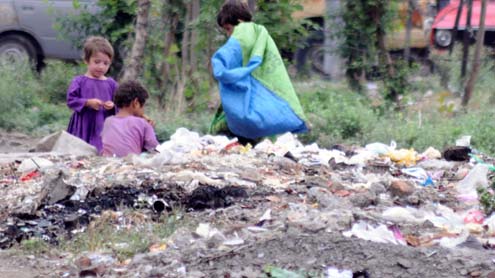Islamabad is one of the few planned cities in the world. It is a very clean city as compared to Pakistani or the third world standards.
The cleanliness of the city is maintained by an army of sanitary staff who dutifully cleanthe streets of the city, pick up the garbage from our doorsteps and clean the sewerage mess. However, those keeping the city clean aredeprived of the same very right that the rest of city enjoys at their expense. They reside in slums located right in the middle of the city, in most unhygienic and hazardous conditions, with no basic necessities available to them. Poor sanitation, unavailability of clean water and outbreak of diseases are making their lives more difficult.
According to the recent report published by Pakistan’s leading newspaper there are almost 20 illegal slums present in this well-planned city of our country which is also the Federal Capital. Almost 80,000 people (as per the report published) are the residents of these slums. They belong to different ethnic and religious groups but the majority is Christian and Pashtun. Most of the residents of these slums have beenresiding there for many years and as per them, in every election political parties assure them the resolution of their problems to get their votes but never show up once they come into power.
The slums are hub of criminal activities including drug abuse and prostitution. Criminal mafias’ control and support illegal activities. Intelligence agencies have reported that the illegalslums are a serious threat to the security of Islamabad as they have become hideouts for criminals. On 29th September,2013 a search operation was carried out by Islamabad police in Sector I-11 Slums and a huge reserve of arms including Kalashnikov, submachine guns and pistols, fake number plates of vehicles and 2 stolen motorbikes were recovered. (Report by “The Nation”, 30th Sep,2013)
Capital Development Authority (CDA)promised to convert these slums into model villages. An initiative was taken in the form of Saidpur Model Village project which ended with a final cost of over PKR. 30 million due to high level corruption involved. After this incident, the idea of model villages was itself dropped by CDA.
In this flawed system, itlooks almost impossible for Govt. to provide housing facilities to all, so instead of starting from scratch, Govt. should improve the living conditions of the residents of these slums step by step starting from providing them the basic necessities of life.
One successful example of Slums Rehabilitation program can be found in Curitiba,Brazil. Slum dwellers are given a bag of fresh produce in exchange for each bag of garbage, which encourages sanitation and nutrition. In addition to this, they are selling land to slum dwellers at discounted rates so that the residents can build their houses on the land they own and are provided free consultation with architect.
Although every city has unique cultural, political, economic and environmental background that dictate what kind of slum rehabilitation are possible but Curitiba shows that positive change can happen.
Since PTI secured a seat in NA-48 as people of Islamabad showed high confidence in them, it is the responsibility of PTI to raise voice for this issue and to pressurize the Government to take necessary measures in bringing formidable condition of slums under control.
Recently PTI MNAs from Islamabad Mrs Nafeesa Inayat & Mr. Asad Umer formed a group of locals to come up with a policy statement in National Assembly considering the wishes of residents of Islamabad and these slums. In meeting a representing delegation of these “ Kachi Abadis” Asad Umer clearly said that PTI will not support and encroachment of illegally established slums , however he has facilitated a meeting between these people and CDA officers to extend the deadline to vacate the slums in F-7,F-6. PTI also have clearly state policy that Govt. should build low cost house in Islamabad and its suburbs to accommodate these people. After all these are the people playing vital role in keeping the city clean and running.
Author: Qurat-ul-Ain













